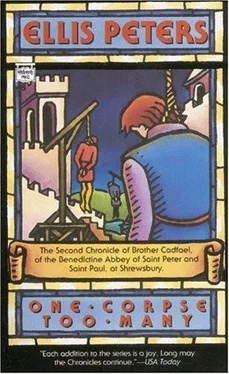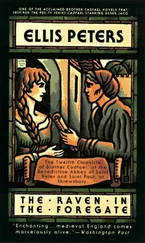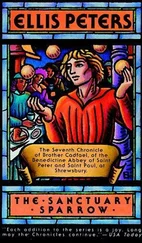Ellis Peters - One Corpse Too Many
Здесь есть возможность читать онлайн «Ellis Peters - One Corpse Too Many» весь текст электронной книги совершенно бесплатно (целиком полную версию без сокращений). В некоторых случаях можно слушать аудио, скачать через торрент в формате fb2 и присутствует краткое содержание. Жанр: Исторический детектив, на английском языке. Описание произведения, (предисловие) а так же отзывы посетителей доступны на портале библиотеки ЛибКат.
- Название:One Corpse Too Many
- Автор:
- Жанр:
- Год:неизвестен
- ISBN:нет данных
- Рейтинг книги:3 / 5. Голосов: 1
-
Избранное:Добавить в избранное
- Отзывы:
-
Ваша оценка:
- 60
- 1
- 2
- 3
- 4
- 5
One Corpse Too Many: краткое содержание, описание и аннотация
Предлагаем к чтению аннотацию, описание, краткое содержание или предисловие (зависит от того, что написал сам автор книги «One Corpse Too Many»). Если вы не нашли необходимую информацию о книге — напишите в комментариях, мы постараемся отыскать её.
One Corpse Too Many — читать онлайн бесплатно полную книгу (весь текст) целиком
Ниже представлен текст книги, разбитый по страницам. Система сохранения места последней прочитанной страницы, позволяет с удобством читать онлайн бесплатно книгу «One Corpse Too Many», без необходимости каждый раз заново искать на чём Вы остановились. Поставьте закладку, и сможете в любой момент перейти на страницу, на которой закончили чтение.
Интервал:
Закладка:
“A mistake a great many others also made,” said Cadfael philosophically. “No doubt we shall weather it.”
“I trust so. But as yet his Grace is in no mind to extend any privileges to the abbey above the other townsfolk. If I should be compelled to enforce, even within your walls, orders I’d rather see stop at the gates, I hope you’ll understand that I do it reluctantly, and have no choice about it.”
He is asking pardon in advance, thought Cadfael, enlightened, for tomorrow’s invasion. So it’s true enough, as I supposed, and he has been given the ill work to do, and is making it clear beforehand that he dislikes the business and would evade it if he could. He may even be making rather more than he need of his repugnance, for the lady’s benefit.
“If that should happen,” he said benignly, “I’m sure every man of my order will realise that you do only what you must, like any soldier under orders. You need not fear that any odium will attach to you.”
“So I have assured Adam many times,” said Aline warmly, and flushed vividly at hearing herself call him by his Christian name. Perhaps it was for the first time. “But he’s hard to convince. No, Adam, it is true — you take to yourself blame which is not your due, as if you had killed Giles with your own hand, which you know is false. How could I even blame the Flemings? They were under orders, too. In such dreadful times as these no one can do more than choose his own road according to his conscience, and bear the consequences of his choice, whatever they may be.”
“In no times, good or bad,” said Cadfael sententiously, “can man do more or better than that. Since I have this chance, lady, I should render you account of the alms you trusted to me, for all are bestowed, and they have benefited three poor, needy souls. For want of names, which I did not enquire, say some prayer for three worthy unfortunates who surely pray for you.”
And so she would, he reflected as he watched her enter the church on Courcelle’s arm. At this crisis season of her life, bereaved of kin, left mistress of a patrimony she had freely dedicated to the king’s service, he judged she was perilously hesitant between the cloister and the world, and for all he had chosen the cloister in his maturity, he heartily wished her the world, if possible a more attractive world than surrounded her now, to employ and fulfil her youth.
Going in to take his place among his brothers, he met Godith making for her own corner. Her eyes questioned brightly, and he said softly: “Yes! Do all as I told you.”
So now what mattered was to make certain that for the rest of the evening he led Beringar into pastures far apart from where Godith operated. What Cadfael did must be noted, what she did must go unseen and unsuspected. And that could not be secured by adhering faithfully to the evening routine. Supper was always a brief meal, Beringar would be sure to be somewhere within sight of the refectory when they emerged. Collations in the chapter house, the formal reading from the lives of the saints, was a part of the day that Cadfael had been known to miss on other occasions, and he did so now, leading his unobtrusive attendant first to the infirmary, where he paid a brief visit to Brother Reginald, who was old and deformed in the joints, and welcomed company, and then to the extreme end of the abbot’s own garden, far away from the herbarium, and farther still from the gate house. By then Godith would be freed from her evening lesson with the novices, and might appear anywhere between the hut and the herbarium and the gates, so it was essential that Beringar should continue to concentrate on Cadfael, even if he was doing nothing more exciting than trimming the dead flowers from the abbot’s roses and clove-pinks. By that stage Cadfael was checking only occasionally that the watch on his movements continued; he was quite certain that it would, and with exemplary patience. During the day it seemed almost casual, hardly expecting action, except that Cadfael was a tricky opponent, and might have decided to act precisely when it was unexpected of him. But it was after dark that things would begin to happen.
When Compline was over there was always, on fine evenings, a brief interlude of leisure in the cloister or the gardens, before the brothers went to their beds. By then it was almost fully dark, and Cadfael was satisfied that Godith was long since where she should be, and Torold beside her. But he thought it best to delay yet a while, and go to the dortoir with the rest. Whether he emerged thence by way of the night stairs into the church, or the outer staircase, someone keeping watch from across the great court, where the guest hall lay, would be able to pick up his traces without trouble.
He chose the night stairs and the open north door of the church, and slipped round the east end of the Lady Chapel and the chapter house to cross the court into the gardens. No need to look round or listen for his shadow, he knew it would be there, moving at leisure, hanging well back from him but keeping him in sight. The night was reasonably dark, but the eyes grew accustomed to it soon, and he knew how securely Beringar could move in darkness. He would expect the night-wanderer to leave by the ford, as they had returned together the previous night. Someone bound on secret business would not pass the porter on the gate, whatever his normal authority.
After he had waded the brook, Cadfael did pause to be sure Beringar was with him. The breaks in the rhythm of the water were very slight, but he caught them, and was content. Now to follow the course of the brook downstream on this side until nearing its junction with the river. There was a little footbridge there, and then it was only a step to the stone bridge that crossed into Shrewsbury. Over the road, and down the slope into the main abbey gardens, and he was already under the shadow of the first archway of the bridge, watching the faint flashes of light from the eddies where once a boat-mill had been moored. In this corner under the stone pier the bushes grew thick, such an awkward slope of ground was not worth clearing for what it would bear. Half-grown willows leaned, trailing leaves in the water, and the bushy growth under their branches would have hidden half a dozen well-screened witnesses.
The boat was there, afloat and tied up to one of the leaning branches, though it was of the light, withy-and-hide type that could be ported easily overland. This time there was good reason it should not, as it usually would, be drawn ashore and turned over in the turf. There was, Cadfael hoped, a solid bundle within it, securely tied up in one or two of the sacks from the mill. It would not have done for him to be seen to be carrying anything. Long before this, he trusted, he had been clearly seen to be empty-handed.
He stepped into the boat and loosed the mooring-rope. The sacking bundle was there, and convincingly heavy when he cautiously tested. A little above him on the slope, drawn into the edge of the bushes, he caught the slight movement of a deeper shadow as he pushed off with the long paddle into the flow under the first archway.
In the event it proved remarkably easy. No matter how keen Hugh Beringar’s sight, he could not possibly discern everything that went on under the bridge, detail by detail. However sharp his hearing, it would bring him only a sound suggesting the rattling of a chain drawn up against stone, with some considerable weight on the end, the splash and trickle of water running out from something newly drawn up, and then the iron rattle of the chain descending; which was exactly what it was, except that Cadfael’s hands slowed and muted the descent, to disguise the fact that the same weight was still attached, and only the bundle concealed in the boat had been sluiced in the Severn briefly, to provide the trickle of water on the stone ledge. The next part might be more risky, since he was by no means certain he had read Beringar’s mind correctly. Brother Cadfael was staking his own life and those of others upon his judgment of men.
Читать дальшеИнтервал:
Закладка:
Похожие книги на «One Corpse Too Many»
Представляем Вашему вниманию похожие книги на «One Corpse Too Many» списком для выбора. Мы отобрали схожую по названию и смыслу литературу в надежде предоставить читателям больше вариантов отыскать новые, интересные, ещё непрочитанные произведения.
Обсуждение, отзывы о книге «One Corpse Too Many» и просто собственные мнения читателей. Оставьте ваши комментарии, напишите, что Вы думаете о произведении, его смысле или главных героях. Укажите что конкретно понравилось, а что нет, и почему Вы так считаете.












